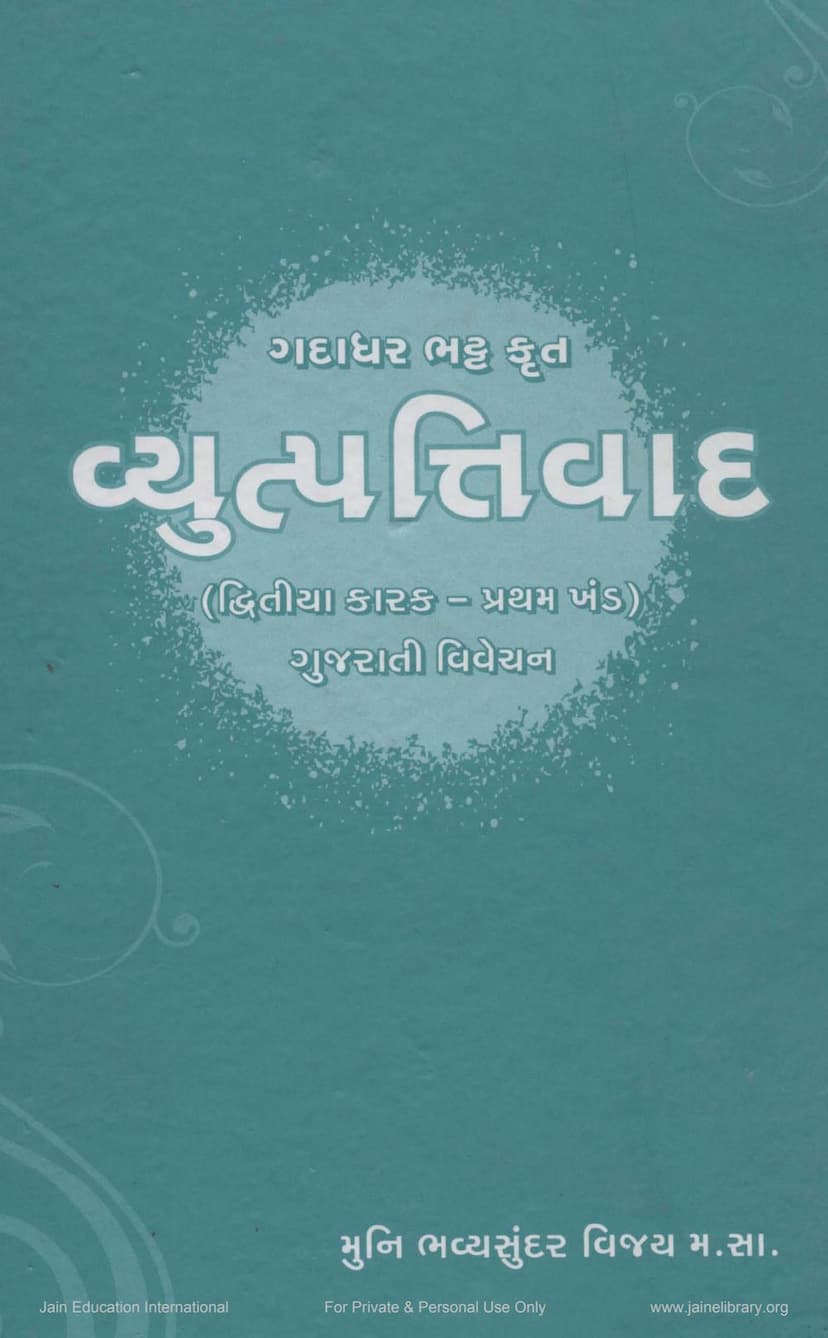Vyutpattivada
Added to library: September 2, 2025

Summary
Here's a comprehensive summary of the Jain text "Vyutpattivada" (Dvitiya Karak, Pratham Khand) by Bhavyasundarvijay, based on the provided Gujarati text:
Title: Vyutpattivada (Dvitiya Karak, Pratham Khand) Author: Munishri Bhavyasundarvijay Commentary: Muni Bhavyasundarvijay Researcher: Muni Rajratnasurishvarji M.S. Publisher: Divya Darshan Trust, Dholka, Ahmedabad Publication Year: Vikram Samvat 2066 / 2010 CE
Overview:
This book is a Gujarati commentary and translation of "Vyutpattivada," a significant work in the Navya Nyaya (New Logic) tradition, originally authored by Gadadhar Bhatt. The commentary is by Muni Bhavyasundarvijay, a disciple of Acharya Vijay Ratnasundarsurishvarji M.S. The publication is dedicated to Acharya Vijay Bhuvanbhanusurishvarji M.S. on his birth centenary.
Purpose of the Publication:
The primary goal of this publication is to make the complex philosophical concepts of Navya Nyaya accessible to Jain scholars, monks, nuns, and earnest students of Jain scriptures. The author believes that studying "Vyutpattivada" is crucial for understanding the works of prominent Jain scholars like Mahopadhyaya Yashovijayji M.S. and for delving into the deeper secrets of Jain knowledge.
Content and Focus:
The book specifically focuses on the second case (Dvitiya Karak) and the first section of "Vyutpattivada." The commentary is based on the original Sanskrit text with support from various critical editions and commentaries like Adarsh, Dipika, Shastrarthakata, and Gudhartha Tattvalika.
Key Themes and Arguments Discussed in the Commentary (as indicated by the table of contents and sampled text):
The commentary delves into the grammatical and philosophical analysis of the use of the second case (Dvitiya Vibhakti) in Sanskrit grammar, particularly within the framework of Navya Nyaya logic. Key topics covered include:
- The meaning of Dvitiya: The text critically examines the meaning of the second case. It argues that while "karma" (object) is mentioned in grammatical rules like "Karmaṇi Dvitiya," the actual meaning of Dvitiya is "karmatva" (the state of being an object) or "phalashālītvam" (being possessed of a result). The commentary differentiates between the direct object and the characteristic of being an object.
- The role of the verb (Dhatu): The text analyzes how verbs convey not just action but also the result of the action (phala). It discusses the distinction between verbs that inherently denote results (like gam dhatu implying samyoga) and those that denote only action (spanda).
- The relationship between verb and object: A significant portion is dedicated to explaining how the object is related to the action and its result. The commentary explores various relational categories (sambandha) like inherence (svavṛttitā), causation (janakatvam), and participation (svasva-sambandha) to establish the connection.
- The concept of "Ākāṅkṣā" (Expectation): The text emphasizes that for words to convey meaning, there must be a mutual expectation (ākāṅkṣā) between them. It argues that the case endings (like Dvitiya) have a specific expectation (ākāṅkṣā) with certain verbs (gamya etc.) but not with others (spandiya etc.), which explains why certain grammatical constructions are permissible and others are not.
- Analysis of specific verbs: The commentary systematically analyzes the grammatical and logical implications of using the second case with various verbs, including roots like gam (to go), tyaj (to leave), nam (to bow), kṛ (to do), jñā (to know), and paṭh (to read), among many others. Each analysis breaks down the meaning of the verb, the case ending, and the resulting sentence structure.
- Distinction from other philosophies: The text explicitly states that while "Vyutpattivada" is an analysis of grammatical categories, its findings are not necessarily to be taken as universally accepted Jain doctrine. It serves as a tool for understanding a specific philosophical system.
- The role of commentaries and tradition: The author acknowledges the contributions of previous commentators and the importance of traditional interpretations in understanding these complex philosophical texts.
- The author's intent: Muni Bhavyasundarvijay expresses a desire for the study of these texts to enhance the understanding of Jain scriptures and the profound teachings of Mahopadhyaya Yashovijayji and other great scholars. He humbly requests forgiveness for any shortcomings due to his own limitations.
Significance of "Vyutpattivada":
"Vyutpattivada" is considered a challenging but rewarding text in the study of Indian logic and grammar. It aims to provide a rigorous explanation of how meaning is derived from words and their grammatical relationships, contributing to a deeper understanding of language and thought within the Nyaya tradition. This Jain commentary makes this significant philosophical text accessible in Gujarati.
Overall:
The book represents a significant effort to preserve and disseminate knowledge of Navya Nyaya within the Jain tradition. It highlights the intellectual rigor applied to grammatical and philosophical analysis, aiming to enrich the understanding of Jain learning and literature.